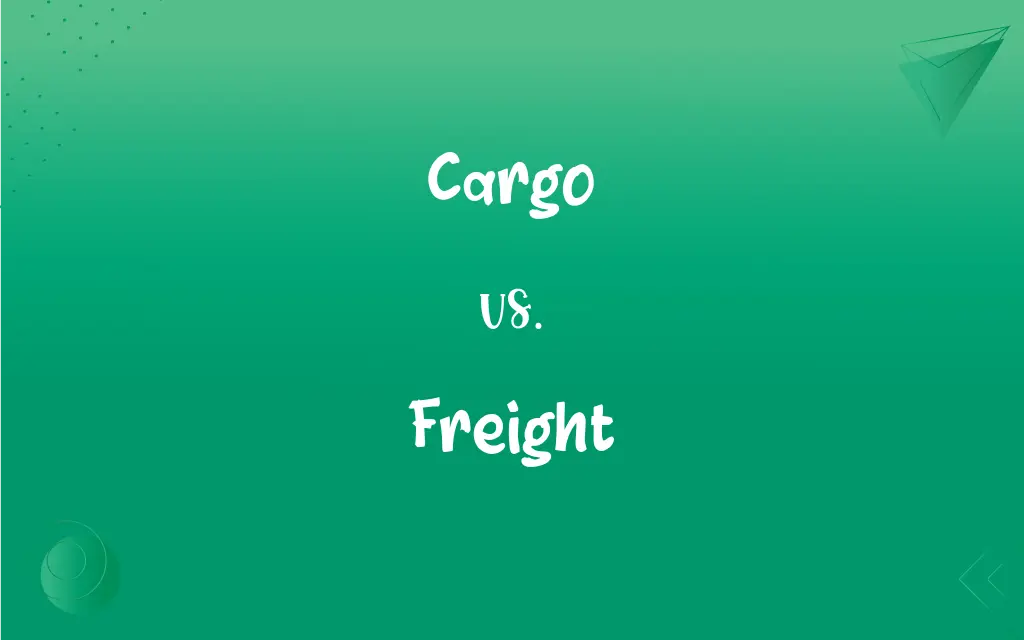Cargo vs. Freight: What's the Difference?
Edited by Aimie Carlson || By Harlon Moss || Published on November 18, 2023
"Cargo" refers to goods carried on a ship, aircraft, or vehicle; "freight" pertains to goods transported in bulk, especially commercially, and can also denote the charge for such transportation.

Key Differences
"Cargo" and "freight" both relate to the transportation of goods, but their contexts and usages differ. "Cargo" emphasizes the physical goods being transported, irrespective of the mode of transportation.
"Freight", on the other hand, not only refers to the goods being transported, especially in large quantities or bulk, but can also allude to the charge or fee for transporting those goods. The term "freight" carries commercial connotations.
An easy way to differentiate between "cargo" and "freight" is by considering their applications. For instance, we'd discuss the "cargo" of a spaceship, but when looking at the commercial shipping industry, we'd often use "freight" to denote goods and the associated costs.
In air travel, you might hear "cargo hold", highlighting where goods are stored on an aircraft. In contrast, "freight train" or "freight charges" are terms commonly found in the logistics and commercial transportation sectors.
Ultimately, while both "cargo" and "freight" deal with transported goods, "cargo" leans more towards the goods themselves, whereas "freight" leans more towards the commercial aspect and the process of transportation.
ADVERTISEMENT
Comparison Chart
Definition
Goods carried on a transport vehicle
Goods transported in bulk and the charge for such transportation
Primary Focus
The goods themselves
Goods and the associated costs
Common Contexts
Spacecraft, airplanes, personal vehicles
Commercial shipping, trains, invoices
Example Usages
Cargo hold, cargo ship
Freight charges, freight train
Commercial Implication
Less emphasis on commercial aspects
Strong commercial and logistics connotations
ADVERTISEMENT
Cargo and Freight Definitions
Cargo
Anything carried or transported.
The spacecraft's cargo included scientific instruments.
Freight
Transporting goods commercially at a charge.
The company specializes in freight services.
Cargo
The load of goods being transported.
The plane had a cargo of electronics.
Freight
A charge for transporting goods.
The freight cost for the shipment was $100.
Cargo
Freight carried by a ship, aircraft, or truck.
The cargo was offloaded at the port.
Freight
Goods transported in bulk by truck, train, ship, or aircraft.
The freight from the warehouse arrived on time.
Cargo
Goods transported, especially by ship, plane, or vehicle.
The cargo of the ship was mostly grain.
Freight
The charge for transportation.
The freight on this package is higher due to its weight.
Cargo
The goods or merchandise conveyed in a vehicle or vessel.
The ship's cargo was delayed due to bad weather.
Freight
The goods or cargo transported by a particular shipment.
The freight was lost at sea.
Cargo
Freight carried by a ship, an aircraft, or another vehicle.
Freight
Goods carried by a vessel or vehicle, especially by a commercial carrier; cargo.
Freight
A burden; a load.
FAQs
Does "freight" only pertain to goods?
No, "freight" can also refer to the charge for transporting goods.
Can "cargo" be used in the context of space travel?
Yes, you might hear terms like "spacecraft cargo."
What is "cargo" primarily used to describe?
"Cargo" primarily refers to goods carried on a ship, plane, or vehicle.
Are "cargo pants" related to transportation?
Not directly. The name refers to the style's large pockets, reminiscent of cargo storage.
Does "cargo" imply any costs?
Not directly. "Cargo" focuses on the goods themselves.
Do "freight charges" vary based on the goods?
Yes, charges can differ based on the weight, volume, and type of goods transported.
What is a "freight train"?
It's a train used to transport goods, especially in bulk.
How do "freight charges" impact businesses?
They can significantly affect a business's logistics and operational costs.
Can "cargo" pertain to passenger luggage on a plane?
Yes, luggage is considered a type of cargo on an aircraft.
Are there "cargo-only" flights?
Yes, these are flights dedicated to transporting goods without passengers.
Is "cargo" a modern term?
While its usage has evolved, "cargo" has been used for centuries to describe transported goods.
Can "freight" denote both the goods and their transportation charges?
Yes, it can refer to both the transported goods and their associated fees.
What's a "freight forwarder"?
It's an agent responsible for organizing shipments for individuals or corporations.
Is "freight" limited to heavy or bulky items?
Not necessarily, but it often denotes goods transported in bulk.
Can "freight" refer to digital or virtual goods?
Traditionally, no. It refers to physical goods and their transportation.
How does "freight" relate to logistics?
"Freight" plays a crucial role in logistics, covering both goods and their transportation dynamics.
Can "cargo" be used for personal vehicles?
Yes, like when referring to the goods in a car's trunk.
Does every ship have "cargo"?
Not necessarily. Some ships may sail without goods, depending on their purpose.
Is "freight" always a paid service?
Typically, yes, especially in commercial contexts.
Can "cargo" refer to a ship's provisions?
Yes, provisions can be considered part of a ship's cargo.
About Author
Written by
Harlon MossHarlon is a seasoned quality moderator and accomplished content writer for Difference Wiki. An alumnus of the prestigious University of California, he earned his degree in Computer Science. Leveraging his academic background, Harlon brings a meticulous and informed perspective to his work, ensuring content accuracy and excellence.
Edited by
Aimie CarlsonAimie Carlson, holding a master's degree in English literature, is a fervent English language enthusiast. She lends her writing talents to Difference Wiki, a prominent website that specializes in comparisons, offering readers insightful analyses that both captivate and inform.






































































